Career
Pioneering the use of the monophonic synthesizers like the ARP 2600 and Minimoog, Hammond Novachord, Hammond C3 organ, and the Mellotron, Paolo Rustichelli composed and produced various movie soundtracks and a progressive rock album, Opera Prima (RCA 1973). Among many scores, made completely with synths, are included Top Box Office European movies like Amici Miei atto III and Testa o Croce.
His jazz-rock album Mystic Man (1996) featured Miles Davis, Carlos Santana, Herbie Hancock, Wayne Shorter, Andy Summers, and Jill Jones. The song "Paisa" reached the Top Ten on the Radio & Records Smooth Jazz/NAC charts.
The song "Full Moon" from Mystic Jazz was composed for Carlos Santana. Tenor Plácido Domingo sang Paolo Rustichelli's "Kyrie" on his album Sacred Songs (2002). The song "My Geisha" from the album Neopagan reached the top ten on the Radio and Records Smooth Jazz/NAC charts of 2006 and 2007.
"Med Groove" from the album Soul Italiano reached No. 1 in smoothjazz.com chart and was an Amazon.com Smooth Jazz Best seller at no. 1 for several weeks in January and February 2014.
Paolo's new single 'Hypnofunk' (2019) it's a musical celebration of the psychedelic era with a touch of hip hop rhythm. Paolo is currently working on his Album "Tempus Fugit" which is scheduled to be released in March 2020.

Carlos Humberto Santana Barragán is an American guitarist, best known as a founding member of the rock band Santana. Born and raised in Mexico where he developed his musical background, he rose to fame in the late 1960s and early 1970s in the United States with Santana, which pioneered a fusion of rock and roll and Latin American jazz. Its sound featured his melodic, blues-based lines set against Latin American and African rhythms played on percussion instruments not generally heard in rock, such as timbales and congas. He experienced a resurgence of popularity and critical acclaim in the late 1990s. In 2015, Rolling Stone magazine listed him at No. 20 on their list of the 100 greatest guitarists. Rolling Stone named Santana 11th greatest guitarist of all time in 2023. He has won 10 Grammy Awards and three Latin Grammy Awards, and was inducted along with his namesake band into the Rock and Roll Hall of Fame in 1998.

Santana is the debut studio album by American Latin rock band Santana. It was released on August 22, 1969. Over half of the album's length is composed of instrumental music, recorded by what was originally a purely free-form jam band. At the suggestion of manager Bill Graham, the band took to writing more conventional songs for more impact, but managed to retain the essence of improvisation in the music.

Larry Eugene Carlton is an American guitarist who built his career as a studio musician in the 1970s and 1980s for acts such as Steely Dan and Joni Mitchell. One of the most sought after guitarists of his era, Carlton has participated in thousands of recording sessions, recorded on hundreds of albums in many genres, including more than 100 gold records, as well as for television and movies. He has been a member of the jazz fusion group the Crusaders and the smooth jazz band Fourplay, and has maintained a long solo career.
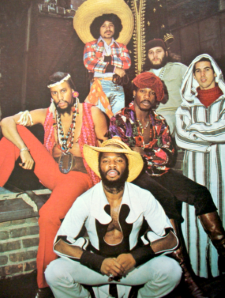
Mandrill is an American funk band from Brooklyn, New York, formed in 1968 by brothers Carlos, Lou, and Ric Wilson. AllMusic called them "One of funk's most progressive outfits... [with an] expansive, eclectic vision."
Guillermo "Jorge" Santana was a Mexican guitarist, brother of musician Carlos Santana.

"Smooth" is a song performed by American rock band Santana and Rob Thomas of Matchbox Twenty, who sings the lead vocals. It was released on June 15, 1999, as the lead single from Santana's 1999 studio album, Supernatural. It was written by Itaal Shur and Thomas, who re-wrote Shur's original melody and lyrics, and produced by Matt Serletic.

Welcome is the fifth studio album by Santana, released in 1973. It followed the jazz-fusion formula that the preceding Caravanserai had inaugurated, but with an expanded and different lineup this time. Gregg Rolie had left the band along with Neal Schon to form Journey, and they were replaced by Tom Coster, Richard Kermode and Leon Thomas, along with guest John McLaughlin, who had collaborated with Carlos Santana on Love Devotion Surrender. Welcome also featured John Coltrane's widow, Alice, as a pianist on the album's opening track, "Going Home" and Flora Purim on vocals. This album was far more experimental than the first four albums, and Welcome did not produce any hit singles.

Spirits Dancing in the Flesh is the sixteenth studio album by Santana. It reached eighty-five in the Billboard 200.

Love Devotion Surrender is an album released in 1973 by guitarists Carlos Santana and John McLaughlin, with the backing of their respective bands, Santana and The Mahavishnu Orchestra. The album was inspired by the teachings of Sri Chinmoy and intended as a tribute to John Coltrane. It contains two Coltrane compositions, two McLaughlin songs, and a traditional gospel song arranged by Santana and McLaughlin. It was certified Gold in 1973.
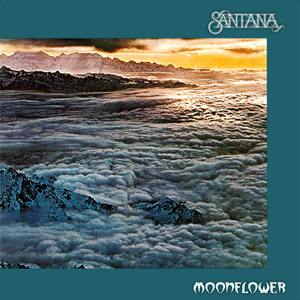
Moonflower is a double album released in 1977 by Santana. The recording features both studio and live tracks, which are interspersed with one another throughout the album. It is perhaps the group's most popular live album, because the 1974 album Lotus did not receive a U.S. domestic release until 1991. It displays a mix between the fusion of Latin and blues rock styles of the late 1960s and early 1970s, and the much more experimental and spiritual jazz fusion sound that characterized the band's mid-1970s work. The live material was recorded during the supporting tour for the Amigos album.

Santana is an American rock band formed in San Francisco in 1966 by Mexican-born guitarist Carlos Santana. The band has undergone various recording and performing line-ups in its history, with Santana being the only consistent member. After signing with Columbia Records, the band's appearance at the Woodstock Festival in 1969 increased their profile, and they went on to record the commercially successful and critically-acclaimed albums Santana (1969), Abraxas (1970), and Santana III (1971). These were recorded by the group's "classic" line-up, featuring Gregg Rolie, Michael Carabello, Michael Shrieve, David Brown, and José "Chepito" Areas. Hit songs of this period include "Evil Ways", "Black Magic Woman", "Oye Como Va", and the instrumental "Samba Pa Ti".

Claus Ogerman was a German arranger, conductor, and composer best known for his work with Billie Holiday, Antonio Carlos Jobim, Frank Sinatra, Michael Brecker, and Diana Krall.
Joseph Thomas "Coke" Escovedo was an American percussionist, who came from a prominent musical family including five musician brothers and his niece, Sheila E. He played in various genres, including R&B, jazz fusion and soul, with bands including Santana, Malo, Cal Tjader, and Azteca.
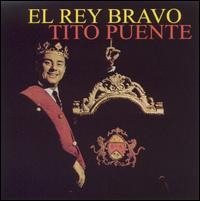
"Oye Cómo Va" is a 1962 cha-cha-chá by Tito Puente, originally released on El Rey Bravo. The song achieved worldwide popularity in 1970, when it was recorded by American rock group Santana for their album Abraxas. This version was released as a single in 1971, reaching number 13 on the Billboard Hot 100, number 11 on the Billboard Easy Listening survey, and number 32 on the R&B chart. The block chord ostinato pattern that repeats throughout the song was most likely borrowed by Puente from Cachao's 1957 mambo "Chanchullo", which was recorded by Puente in 1959.
"Samba pa ti" is an instrumental by Latin rock band Santana, from their 1970 album, Abraxas. In English, the title means "Samba for You." It was released as a single in 1973. The song charted at No. 11 in the Netherlands, No. 43 on the German charts, and No. 27 on the UK Singles Chart, Santana's first single to chart in the United Kingdom.
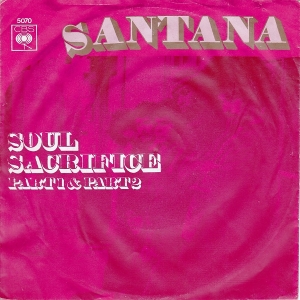
"Soul Sacrifice" is an instrumental composed and recorded by the American rock group Santana. Identified as one of the highlights of the 1969 Woodstock festival and documentary film, "Soul Sacrifice" features extended guitar passages by Carlos Santana and a percussion section with a solo by drummer Michael Shrieve.
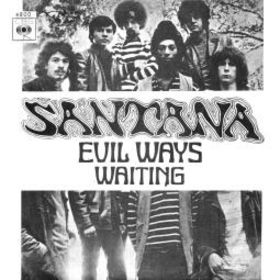
"Evil Ways" is a song made famous by Mexican-American rock band Santana from their 1969 self-titled debut album. It was written by Clarence "Sonny" Henry and originally recorded by jazz percussionist Willie Bobo on his 1967 album Bobo Motion. Alongside Santana's release in 1969, "Evil Ways" was also recorded by the band The Village Callers. The lyrics of the song are written in simple verse form.

Itaal Shur is an American composer, producer and musician. He has written songs for a number of musicians, including Maxwell, Jewel and Enrique Iglesias, and has produced records for various artists, including Kronos Quartet, The Scumfrog and Lucy Woodward. He was the founding member of the acid jazz group Groove Collective, and has released three solo albums.
"Europa (Earth's Cry Heaven's Smile)" is an instrumental from the Santana album Amigos, written by Carlos Santana and Tom Coster. It is one of Santana's most popular compositions and it reached the top in the Spanish Singles Chart in July 1976.

"Cc'è la luna n menzu ô mari" (Sicilian for 'There's the moon amid the sea'), mostly known in the English-speaking world as "C'è la luna mezzo mare", "Luna mezz'o mare" and other similar titles, is a comic Sicilian song with worldwide popularity, traditionally styled as a brisk 6
8 tarantella. The song portrays a mother-daughter "coming of age" exchange consisting of various comic, and sometimes sexual, innuendos. It is frequently performed at Italian-American wedding receptions and other festive occasions. Hit versions have included "Oh! Ma-Ma! (The Butcher Boy)" by Rudy Vallée and "Lazy Mary (Luna Mezzo Mare)" by Lou Monte.















